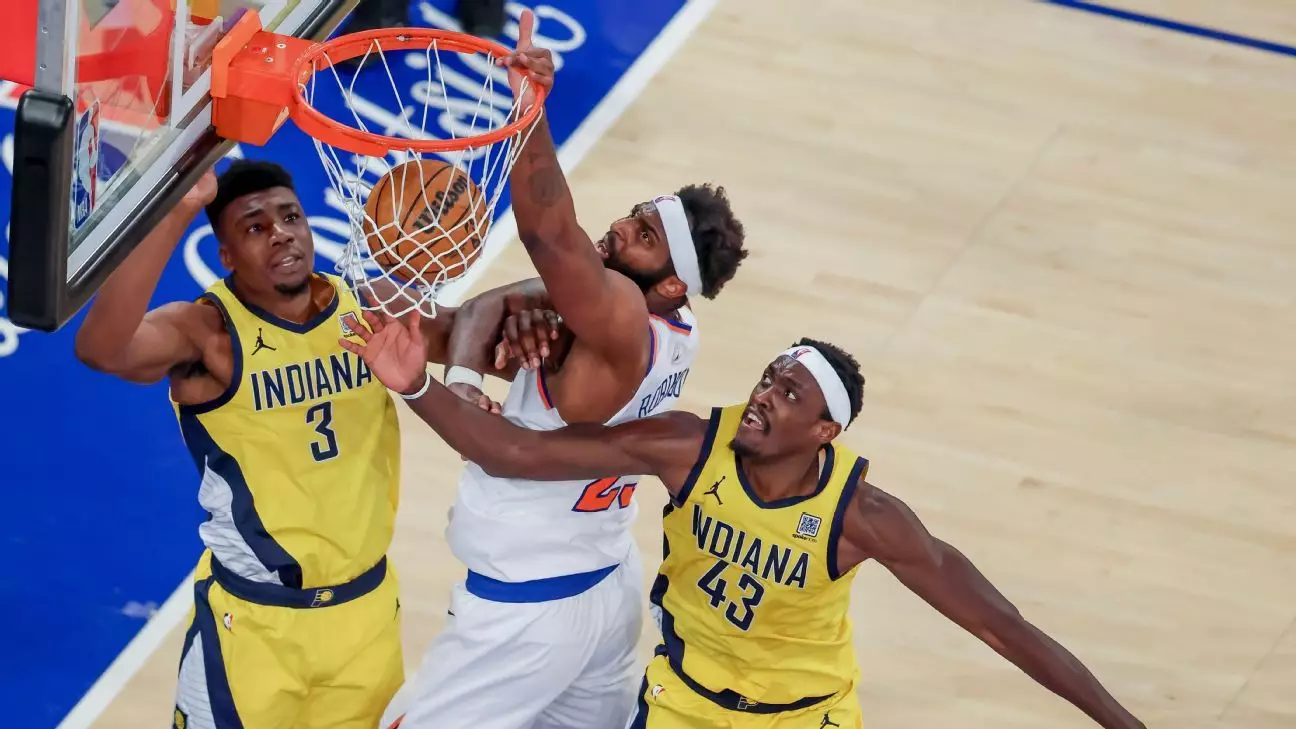The Indiana Pacers faced an unexpected hurdle during their playoff run with a disappointing 111-94 defeat against the New York Knicks. This loss served as a stark reminder of the volatility of postseason basketball, where the stakes are high and pressure mounts with each game. Historically, every team encounters such moments, and the Pacers, led by star guard Tyrese Haliburton, are no exception. Despite struggling offensively and committing an alarming number of turnovers, Haliburton emphasized a critical point in the aftermath: panic is unwarranted for this resilient team.
Haliburton’s words resonate deeply within a playoff context; experiencing a low point is part of the journey. While the Pacers currently lead the series 3-2, this loss highlights the importance of bouncing back when faced with adversity. The NBA season stands as a testament to the unpredictability of game outcomes, often hinging on momentum shifts and emotional resilience.
Offensive Lapses and Opportunities for Growth
Analyzing the game in detail reveals a puzzling offensive performance from the Pacers. Their starters combined for a mere 37 points, marking one of the worst outings of the playoffs. The offense seemed stagnant, lacking the rhythm and cohesion necessary for playoff success. A total of 20 turnovers compounded the issue, criminally undermining any potential scoring opportunities. Such trends raise significant questions about the team’s preparation and adaptability as they approach critical games.
When coach Rick Carlisle addressed the media, he cut straight to the heart of the issue, citing the team’s failure to establish the desired intensity from the onset. It’s crucial to recognize that postseason games are not merely about talent but about grit and tenacity—qualities that can often sway the outcome in highly competitive environments. Carlisle’s candid assessment also serves as a call to action for the players, urging them to regroup and approach the upcoming Game 6 with renewed vigor and focus.
Conversely, it was also a night where individual performances drew attention. Bennedict Mathurin emerged as a bright spot, scoring 23 points off the bench, demonstrating the potential for critical contributions when primary players struggle. Yet, the glaring absence of a strong performance from Haliburton is alarming. The star’s inability to effectively engage in offense, registering only eight points, culminates in the pressing need for enhanced collaboration and pace as they plan for their next clash with the Knicks.
Embracing the Challenge Ahead
The Pacers recognize the importance of regaining their competitive edge in Game 6, especially with the home-court advantage playing a pivotal role in playoffs. Aaron Nesmith’s blunt reflection on their recent defeat emphasizes a crucial aspect of sportsmanship: sometimes adversity serves as a powerful teacher. It’s during these moments of discomfort that teams often discover their true potential. The Pacers’ attitude signals a belief system grounded in overcoming challenges rather than succumbing to them.
This mentality reflects a broader theme: the psychology of sports performance during critical moments is as significant as physical capabilities. As players like Pascal Siakam note, these situations teach essential lessons that forge stronger teams. The self-awareness shown by each player, especially with Haliburton’s commitment to improving, sets a tone of accountability, further nurturing resilience within the squad.
Anticipating the Comeback
Looking ahead, the Pacers must harness this loss as fuel for progress. History supports the notion that teams often rebound strongly after a setback. The series retains enough tension and excitement, and the upcoming game in Indianapolis presents a golden opportunity for redemption. It stands to reason that the Pacers, boasting a record of not losing back-to-back games since March, hold a psychological edge despite practical missteps during their last outing.
The narrative focuses on the importance of character and resolve. The message is clear: it is not solely about the scoreline; it’s about the journey, the determination to improve, and the willingness to rise again. Games like these remind the Pacers that true championship contenders don’t merely revel in victories—they learn, adapt, and grow stronger from defeat. This ethos may well be the defining characteristic that propels them deeper into the postseason, transforming setbacks into stepping stones.

